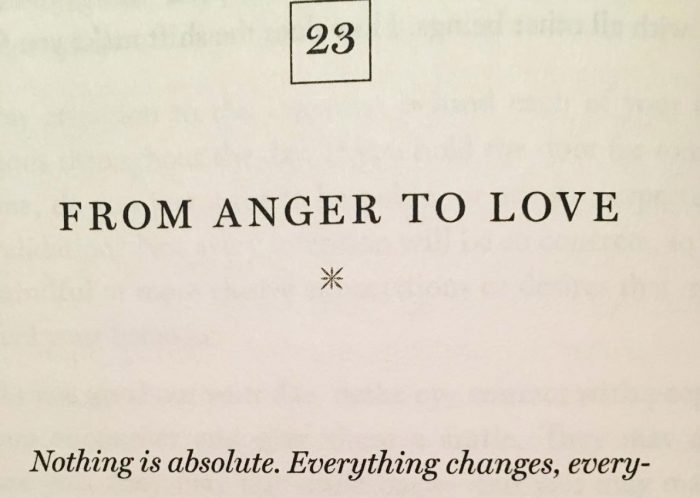![]()
“Our senses enable us to perceive only a minute portion of the outside world.” ~ Nikola Tesla
~
I like to think of myself as a free-spirited, open-minded, live-in-the-moment, no-expectations kind of woman.
Yet, when I have to face a reality that doesn’t fulfill my desires—like the unwanted end of a relationship—I resort to all sorts of mechanisms to push this undesired reality away.
This is the moment of truth, the test life keeps giving me to check if I am really living up to my words and who I say I am. As I revisit the shared moments, the half-promises, the red flags, the late-night conversations—my old belief systems, which I thought I had debunked, re-emerge stronger than ever, reaffirming the old stories:
I’m not good enough.
It was all a lie.
He used me.
I used him.
The wounded heart (and the ego) wants to find someone or something to blame. It needs a resolution, a yes or no answer, a period not a comma, a clear, singular explanation of what caused this unwanted scenario. It needs an absolute truth. Until we inherently let go of this unilateral need for resolution and absolution, we are simply adding insult to injury.
If we become aware of the lenses through which we experience our reality—whether they are the lenses of infatuation and lust, or the ones of neediness and clinginess, or the ones of past disappointments and lingering fears—we can accept the fact that our experience is nothing but a perception, and there is nothing absolute about that.
Think of the infiniteness of the sky and the ocean. Think of the grandiosity the earth supplies us with: its extensive woods, plains, mountains, valleys, seas, canyons, and rivers. Think of the universe, the stars, the planets, and all that exists beyond our knowledge.
Then, think of the two tiny circles that are our pupils, the physical lenses through which we experience reality. Imagine our vision, both frontal and peripheral, and realize its minuscule scope compared to what’s out there to see, experience, touch, perceive—regardless of if it’s 20-20.
There’s only so much our physical eyes can see, and yet there is a seemingly infinite amount of thoughts, prejudices, and judgments that populate our minds. What are these based on? Only a partial, limited, single point of view.
The truth is, our reality is just one of many possible versions we could perceive. The distortion of reality comes not only from the physically limited viewpoint of our eyes, but also from the labels, meanings, and assumptions that our past experiences and our belief systems attach to what we absorb through them.
Imagine what it would be like if we simply considered that all the absolute truths that we hold on to, the many rules and expectations we want ourselves and others to act according to, were untrue. What if our thoughts and our emotions, two of the things we cling to so dearly, were not so righteous and all-encompassing? What if they were just a small part of a much bigger whole? One thought is just that: one little thought of millions. The same goes for emotions. Neither defines or controls us—unless we empower them to do so by letting them run unchecked through our psyche.
Think of how liberating it feels to entertain the question, “What if the opposite is true?” Even if we don’t believe it, just entertaining the possibility that that which is causing us so much pain or anxiety or fear could simply be untrue is liberating, like a ray of light and a breath of fresh air after being locked in a dark closet. Think of how this process and attitude could be beneficial in the aftermath of a breakup: I knew it would end up like this because I am not worthy of love becomes I know I am worthy of love, so this ended because it was no longer serving me.
Allowing the possibility that our perception of what occurred is not the only truth, and believing that others in our lives were never in any way compelled to fulfill expectations or roles we assigned to them, can set us free. When we give less power to our own thoughts, views, emotions, and personal experiences, we paradoxically empower our truest self—free to see more than one interpretation, more than one truth, more than one point of view. Free to acknowledge that nobody’s agenda is to make us miserable or to inflict pain on us. Everyone else is also just going through life through their own set of little eyes, and their own set of preconceptions, beliefs, fears, and limitations.
Our ego likes taking ownership of things, even negative things. The ego takes everything personally and likes to reinforce the thoughts and the emotions that would validate that it is indeed all about us. But in fact, nothing is personal, as hard as this is to accept.
“Whatever happens around you, don’t take it personally…nothing other people do is because of you. It is because of themselves. All people live in their own dream, in their own mind; they are in a completely different world from the one we live in. When we take something personally, we make the assumption that they know what is in our world, and we try to impose our world on their world.” ~ Don Miguel Ruiz
In order to avoid unnecessary, self-inflicted suffering after a breakup, we need to become more aware of the fact that everyone is going through the same struggle of trying to make sense of “reality” as best they can. In the aftermath of a breakup, let go of the need to find the one reason, action, conversation, or person to blame. Instead, embrace the impermanence and be grateful of yet another lesson, another chance to look deeper within; you are simply getting closer to awakening.
The more attuned we are with the relativity of things, the more likely it becomes that we will attract a similar counterpart, one with whom we can move along in your parallel realities, together, without expectations or grasping at one absolute truth.
~
Relephant:
Our Ego loves creating a Struggle—but we don’t have to Let It.
~
~
Author: Vita Semeraro
Image: Author’s own
Editor: Callie Rushton
Copy Editor: Yoli Ramazzina
Social Editor: Catherine Monkman



Read 0 comments and reply